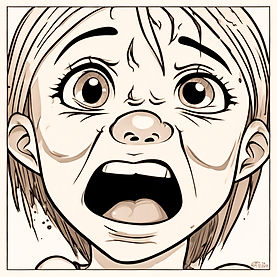Youth Mental Health...
Mental health affects everyone and anyone at any given time in their and our lives. It can happen to anyone at any age. Even young people. Poor mental health can cause young people to mkae decisions that they usually wouldn't make or do things that they wouldn't usually do, such as risky behaviours, risky activities, experiment with substance, carry weapons and mental health can make you a target for others who want to exploit you or coerce you into doing things that are wrong, things you don't want to do.
The number of young people experincing mental health problems is on the rise...



![fear expression]_edited.jpg](https://static.wixstatic.com/media/505c0f_1db0d1af6b7f42f7a8075424bd3822d0~mv2.jpg/v1/fill/w_277,h_277,al_c,q_80,usm_0.66_1.00_0.01,enc_auto/fear%20expression%5D_edited.jpg)
The world is full of dangers, we don’t have to look far to know this. We are reminded of this fact every single day when ever we turn on our televisions, turn on our radio’s, when we look at our news feeds on our devices, there is no escape from it and it can be overwhelming. As adults we know and understand the world a little bit better and we have the life experience and the resilience to carry on with our day regardless of what we hear or see or reminded of. Sometimes some of us will get anxious or stressed but we always somehow manage to move on from it or work out ways to strategically occupy ourselves with the activities of our daily lives.
But young minds may not always cope so well, and may not be as resilient, especially when you take into account all of the other daily stresses and anxieties they already have such as school, peer groups, fitting in, making friends, studying, money, fashion, social media, PUBERTY which comes with its own stresses and worries. We all remember our teenage years, the awkward changes in our bodies, hair growth, voices breaking, bits growing, the constant bombardment of hormones, so many hormones! Young people have a battle of change going on from the inside out and it isn’t just hormones, their minds are also changing, their brains are developing, they are transitioning from childhood into adulthood and young people are expected top just ‘grow up’ over-night. We all remember our teenage years and how weirdly crazy and miserably exciting that was, but the world has changed since we ventured into our adult lives, as a society we have changed, and over the last several years there have been HUGE changes that have happened in the world, changes that have happened to all of us collectively, technological changes, social changes, communication changes, educational changes, so many changes in such a short time. It’s a wonder anyone has managed to keep up. The world is completely different from when we were young people, it is so much more difficult to grow up in now.
Mental health can feel complicated, because it is complicated, we all struggle from time to time with the ways in which we think and feel, some days may not be the same as others, while some days will just blend together and you end up feeling…lost.
Mental health is not something you or a young person has to go through alone. The best tool we can utilise is our voices. It is okay to not be okay and it is fine to say ‘I’m not okay’. Make mental health a talking point in your home, make it a conversation, make it feel okay to say ‘I’m not okay’. That is the best starting point. Having an open dialogue where everyone has control of the narrative is empowering and it also gives each of us a sense of worth, value and most importantly relevance. A lot of young people feel misunderstood, misrepresented, a lot of young people find it difficult to know what to say or how to say it, it could be because they are yet to know the correct way to describe what and how they are feeling or it could be because they feel as though they can’t open up., they simply may not know where to go. Making ‘home’ a safe space where feelings, thoughts, emotions and topics of mental health can be explored will benefit not only a young person but also the care giver. Parents often struggle to know what is going on inside the mind of a young person, let alone what is going on within their lives. Giving each other the opportunity to share can work wonders. Always approach the topic with an open mind and without conflict. Conflict only encourages more conflict, communication is always a better resolve.
"Communication is key"
"It's okay to not be okay"
School, college, university, it is stressful, and I am sure a lot of young people describe it as a prison for learning. Education comes with stress and anxiety, not just due to the immense amount of young people that attend, but also the amount of work that goes into learning. It can be overwhelming, especially today. Young people spend up to 30 hours a week in school, and that is without the morning club or after school clubs, it doesn’t sound a lot but school doesn’t end for young person at 3pm, home work is often given on a daily basis, and it isn’t just one piece of homework, on average a teenager will have 3-4 different lessons a day, imagine being given 3-4 different assignments a day to complete at home. The expectation to keep up with other students is hard work, trying to meet deadlines is hard work, trying to know everything you are expected to know is hard work, especially in overcrowded classrooms where support is not always available, where your learning style can easily go unrecognised, where your learning difficulties are misrepresented and misinterpreted. It is difficult, and feeling lost while others around you seem to be doing fine can be isolating, humiliating and upsetting. Especially if your distress and anxiety is seen as a behavioural problem.
School isn’t just about education, it has its own social structure, and it can be hugely impactful on a young person’s self-esteem, self-worth, self-confidence, everything to do with the self. School for some young people will be an amazing experience, while for others, it can be the worst experience of their lives and very traumatising. Bullying is nothing new, it has always existed, and it probably always will. Bullying is something that parents and teachers have been in constant combat with since day one and it isn’t an easily won
battle.
There are many different reasons why young people will bully each other, some of the reasons have not changed, but the methods of bullying have. It isn’t just name calling or pulling hair anymore, today it is brutal and it is violent and it is dangerous, it is also very destructive. Technology has evolved drastically in the past ten years, social media, smart phones, tablets, the internet, it has improved a lot of peoples lives and has done extreme wonders for us all, it has brought the world closer together but it has also given others the opportunity to bully and to hurt people. Now if a young person is bullied, there is a global audience. Bullies have evolved and it isn’t only just physical violence or name calling, it is also the destruction of character. Videos are uploaded, images are uploaded, names are uploaded, rumours are uploaded for the world to watch and for the world to comment on. Not everyone in this world is a nice person. Bullies now have an audience and this audience can be very encouraging and influential and it can lead to severe mental health problems and conditions for the victims and can lead on to self-harm and thoughts of suicide. We don’t have to wait long to hear on the news about the suicide of a young person due to bullying, it is more or less a daily occurrence somewhere in the world.



"Negative comparison"

Social media is Something we all use, and it is something we all worry about. There isn’t a day that goes by where we don’t hear a horror story that involves social media. Social media is a powerful tool for both the good and the bad. It has encouraged communities to grow and evolve, it has brought billions of people together, it has reduced the impact of loneliness and during the pandemic it helped to keep a lot of people company as well as educated, in work and most importantly safe. But with the good there is also the bad. Social media can be very influential, and it can be addictive. Social media is designed to keep you coming back for more, and it is designed so no matter how long you sit scrolling, you will never reach the end of the feed. Studies have shown that there is a relationship between mental health and the amount of time spent on social media. The more social media a young person has access of and the time spent on social media can have an impact of their own mental health and well-being. A negative effect. Social media encourages a culture of comparison, we experience the lives of others on social media, and we compare our own to theirs. As adults we are more resilient, not all of us but most of us are and we understand perfectly well that what we see on social media is not always a true honest representation of an individual’s life. We are all guilty of over exaggerating our lives when we know we have an audience, we have all strategically manufactured a post to represent ourselves in an exaggerated and extravagant way. It’s not illegal, but we have all done it and when we see others doing it, we understand the simple truth. What you see isn’t always what it is. But young people don’t always understand this, and it is very easy to feel left behind, to feel as though they are somehow missing out on something important.
This fear of missing out can contribute to feeling inadequate, to question worth and value, it can also encourage behaviours such as eating disorder, self-harm and poor mental well-being. It doesn’t matter who you are or how old you are, comparing your life to someone else’s in a negative way is harmful, you need to remember that a huge percentage of what you see on social media is a misrepresentation. Also remember that it doesn’t matter what someone else has, there are amazing things in your life that matter more.
Life is full of pressures, it would be impossible to list them all, and it would be impossible to say things will get better. Sometimes things feel as though they won’t, but with the right help an the right support, you have a greater chance at feeling better a again, and not just feeling better, but being more resilient, being more accepting of change’s, life is full of change, that is never going to change. As a society we need to be supportive of each other and more accepting, we need to be ore aware of who we are and the people around us. We cannot control or change how we are treated by others but we can change and control the way we treat others. Kindness is like a smile, it is contagious, lets spread it.


"Kindness is contagious"
Remember, your young person is 'young', they are going to make mistakes, they will most likely push boundaries and limits to see what is and isn't acceptable, it's part of growing up and it is easy to lose your way in this world and get lost.
All we can do is influence our young people to make the right decisions and the right choices, or be there for them when they fall.